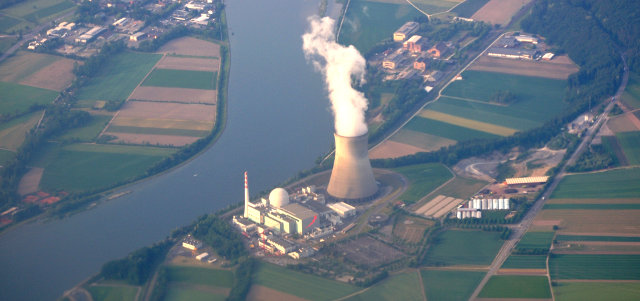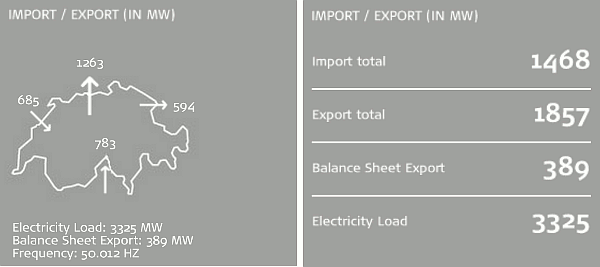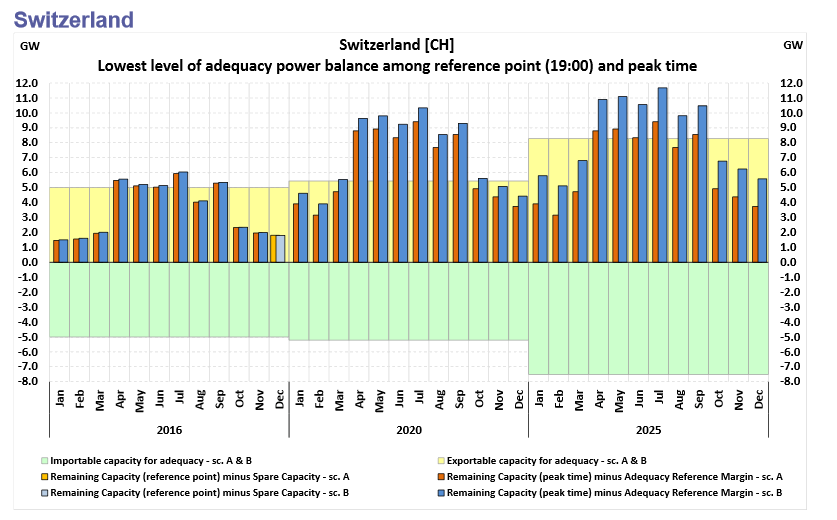In August, the fifth of five nuclear plants in Switzerland went off-line, but only for two days. There were no blackouts. Craig Morris investigates.

Swiss turned off all its nuclear power plants – and the lights stayed on. (Photo by Hansueli Krapf, CC BY-SA 3.0)
Switzerland has five nuclear plants, each of which has recently had to be shut down for different reasons:
- Leibstadt (1,245 megawatts) and Mühleberg (355 megawatts) are undergoing scheduled maintenance. Nuclear plants in Europe tend to undergo such inspections in the summer, when power demand is lower than in the cold season. Normally, these power plants would go back online soon – replacing fuel rods is expected to take five weeks at Leibstadt (report in German). Investigations from 2014 at Mühleberg, however, revealed micro-fissures in the pressure vessel, similar to those found previously in Belgium (report in German). And now, the inspections are not expected to be finished this year.
- Beznau 1, the oldest operating reactor in the world (365 megawatts), was taken off-line in March because of “irregularities in the pressure vessel” – not micro-fissures (report in German), but points of low material density (possibly similar to the problem in Flamanville, France).
- Likewise, Beznau 2 (365 megawatts) is also expected to be off-line for months, primarily because the pressure vessel cover needs replacing.
- Finally, Gösgen (970 megawatts) was taken down on August 15, when there was a leak in the non-nuclear steam tract (report in German). Two days later, however, the reactor was back in full operation (report in German).
In short, Switzerland thus briefly lost 3,300 megawatts of baseload generation capacity. Power demand in the country ranges from around 5,000 (baseload) to over 10,000 megawatts (peak) in the summer. In a normal year, the Swiss get some 40 percent of their electricity from nuclear. Fortunately, Switzerland had sufficient water for its hydropower plants at the time, allowing it to fill the gap (report in German). No foreign power was needed.
The chart below shows the trading situation on August 17. Switzerland exported to Germany and Austria at the time but imported from France and Italy. Italian power exports to Switzerland are an exception; the Italians are the biggest power importers in Europe. But contrary to a common misconception, power trading takes place almost exclusively based on price, not to prevent blackouts during emergencies. On that day, when Switzerland was nuclear-free, the sun was shining in Italy (but not much in Germany), so Italian power was relatively cheap.

On a nuclear-free workday (August 17), Switzerland remained a net power exporter, leading opponents of nuclear in the country to argue that the Swiss can do without nuclear power. The country aims to close its last nuclear plant in 2034. Source: SwissGrid.
But even if Switzerland needed to import power, enough is on hand. In June, Entso-e, the European organization of grid operators, estimated that there is 100 gigawatts of surplus “secure capacity” (meaning that it is dispatchable) in Europe at the moment (PDF). Switzerland currently has some 5,000 megawatts of “importable capacity for adequacy” (see chart below from the study), roughly 50 percent more than its entire installed nuclear fleet. So while the country makes do with a single nuclear plant over the next few weeks, it need not fear a power outage.

Switzerland could theoretically get more electricity from imports than it does from nuclear. Source: Entso-e.
Most of all, the data show that Switzerland is flooded with electricity from all sides. In 2013, the country consumed 63.4 TWh of electricity, but 74.8 TWh was traded (38.6 TWh exported and 36.2 TWh imported). As a relatively small country surrounded on all sides by others, the Swiss power trading situation thus resembles Denmark’s – a commonality we will revisit in a future post.
Craig Morris (@PPchef) is the lead author of German Energy Transition. He directs Petite Planète and writes every workday for Renewables International.
A mad house …..
During the worst heat wave in Europe
http://energytransition.de/2015/08/european-power-sector-heat-wave/
failed atom power plants in Switzerland are replaced by oil fired back-up boilers to supply the local district heating systems:
http://www.aargauerzeitung.ch/aargau/zurzach/oel-statt-akw-fernwaerme-hoehere-heizkosten-fuer-refuna-kunden-129482972
And all our nuclear power was replaced by imports from French nuclear power plants, coal power and highly subsidised wind energy from Germany. No way, that our nuclear power stations can be shut off. There is no clean replacement!